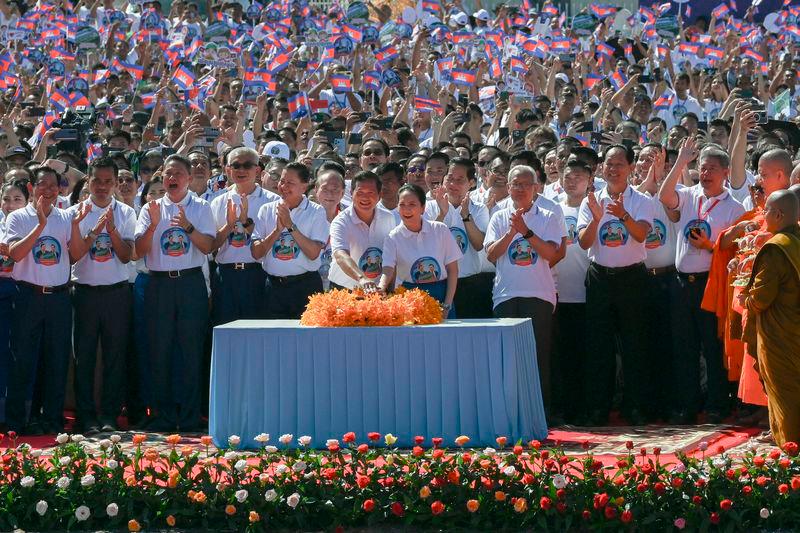PREK TAKEO: Cambodia’s Prime Minister Hun Manet on Monday launched a controversial $1.7 billion canal project that aims to provide a new link from the Mekong river to the sea.
At a launch event in Prek Takeo, southeast of the capital Phnom Penh, Manet called the 180-kilometre (110-mile) project “historic”, as drums sounded and fireworks shot into the air.
The event was attended by thousands wearing t-shirts bearing images of Manet and his father Hun Sun, who ruled the country for nearly four decades.
“We must build this canal at all costs,“ said Manet, who drew cheers as he launched the project by pressing a ceremonial button with his wife Pich Chanmony.
The Funan Techo canal will run from a spot on the Mekong river, about an hour’s drive southeast of Phnom Penh, to the sea in the Gulf of Thailand and is due to be completed in 2028.
Around a third of cargo coming to and from Cambodia uses Vietnamese ports via the Mekong, but authorities hope this number will fall to around 10 percent once the canal is completed.
The limited capacity of the waterway -- 100 metres (328 feet) wide and 5.4 metres (17.7 feet) deep -- has raised questions about whether the lofty economic goals can be reached.
The project also comes shrouded in uncertainty, including its main purpose -- whether for shipping or irrigation -- who will fund it, and how it will affect the flow of the Mekong -- one of the world’s longest rivers.
Conservationists have long warned that the river, which supports up to a quarter of the world’s freshwater fish catch and half of Vietnam’s rice production, is at risk from infrastructure projects, pollution, sand mining, and climate change.
Cambodia, Laos, Vietnam, and Thailand are signatories to the 1995 Mekong River Agreement, which governs the distribution of the river’s resources.
Cambodia has notified the Mekong River Commission (MRC) of its plans for the canal, but Vietnam wants more information about the project.
- ‘Nose to breathe through’ -
Phnom Penh argues the project affects only a Mekong tributary and therefore requires only the notification it has already submitted.
The canal, one of former prime minister Hun Sun’s signature infrastructure projects, is seen as a galvanising national undertaking to build support for his successor and son.
Hun Sen has described the canal as giving the country a “nose to breathe through”.
The government says the project will offer an alternative for container ships that currently cross into Vietnam before heading to the sea, allowing Cambodia to keep transport revenue in-country.
It says it is planning riverside economic zones along the route that it says could create tens of thousands of jobs for the country, which is among the poorest in Southeast Asia.
Villagers living along the projected route of the canal, however, spoke to AFP about their anguish at having their homes expropriated as construction gets underway.
Some, who live near the canal, said they were not invited to join the event, saying they watched the ceremony from home with mixed feelings.
“We feel both happy and worried because we have not been informed about the compensation,“ a 51-year woman, who asked not to be named, told AFP.
“We are asking for an appropriate compensation. People told us that when there are developments, there are tears. So we are worried about that.”
Deputy Prime Minister Sun Chanthol, who spearheaded the project, said at the event on Monday that the canal would benefit 1.6 million people and create “thousands of jobs”.
He promised that the government would provide “fair compensation” to those affected by the project.
Rights activists in the country point to a pattern of expropriation for infrastructure projects that has left people struggling to relocate with minimal compensation.
- China financed -
Last year, the China Road and Bridge Corporation (CRBC), a Chinese construction giant that has financed other infrastructure in Cambodia, agreed to a feasibility study of the project.
Cambodian officials have suggested the Chinese state-owned company could finance part of the canal, but CRBC has not released its study or made any public commitment.
While Cambodia is a close ally of Beijing, Hun Sen has denied the canal will be part of China’s Belt and Road infrastructure plan.
The project has sparked fears in neighbouring Vietnam that the canal could be used by Chinese warships.
Cambodia and China held their largest annual military exercises in May, involving several Chinese miliary vessels and hundreds of military personnel.
In December, two Chinese warships made a first visit to a Cambodian naval base that the United States says could be used to boost China’s influence in the Gulf of Thailand.
Cambodian officials have repeatedly denied that the base, near the port city of Sihanoukville, is for use by any foreign power.









